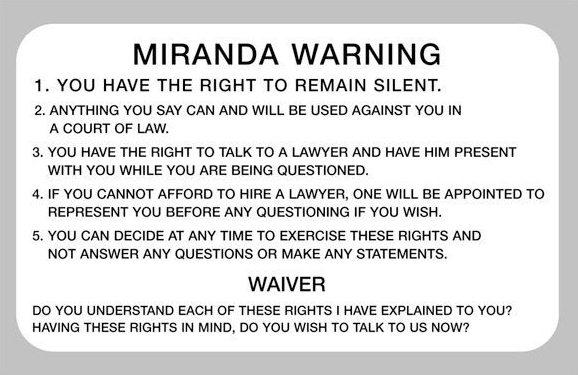 The Miranda warnings came about from a 1966 United States Supreme Court decision in the case of Miranda v. Arizona, 384 U.S. 436 (1966). The Miranda warning (or as many people refer to it, the Miranda rights) is a series of rights read to anyone who is being arrested.
The Miranda warnings came about from a 1966 United States Supreme Court decision in the case of Miranda v. Arizona, 384 U.S. 436 (1966). The Miranda warning (or as many people refer to it, the Miranda rights) is a series of rights read to anyone who is being arrested.
What are the Miranda Warnings?
The specific Miranda warnings are:
- You have the right to remain silent;
- Anything you say may be used against you in a court of law;
- You have the right to have an attorney present before and during the questioning; and
- If you cannot afford the services of an attorney, you have the right to have one appointed, at public expense and without cost to you, to represent you before and during the questioning.
When must I be given my Miranda Warnings?
Many people believe that police must give them their Miranda warnings whenever they are arrested. That is incorrect.
The police must only give you your Miranda warnings when:
- You are in a “custodial setting.” That doesn’t mean you are under arrest. It is enough that you reasonably feel that you are not free to leave. That is why I tell my clients always ask, “Am I free to leave?” ; and
- The police want to interrogate you.
For example, if you walk up to the police to ask a question neither of these conditions are met. However, if you pulled over by the police and ask “Am I free to leave?” the first condition is met. The question then becomes when are you being “interrogated” such that you must be given your Miranda warnings.
Will my case be dismissed if the Police don’t give me my Miranda Warnings?
No. Your case won’t automatically be dismissed if you aren’t given your Miranda Warnings. However, if the only evidence of criminal conduct is your statement, and that statement can’t be introduced into evidence, your case will likely be dismissed.
In practical terms, the Supreme Court’s decision has helped law enforcement. It tells them if they give you the warnings, then a Judge is unlikely to dismiss the statements you voluntarily made after knowing of your rights. However, there are exceptions to this rule. For example, spontaneous statements you make while in custody, not a result of police questioning are admissible. Also, let’s say you are testifying at trial. Your statement given to the police without being advised of your rights can be used to impeach you. That means the prosecutor can ask you why your testimony is different then what you previously told the officer.
Free Resources for you
If you are charged with a Crime, DUI, or Traffic offense you need to know your options before going to court. On this page you will see an offer for my books, click the link, put your name and contact information and we will give you these books free:
- Arrested for Drunk Driving? Learn how to Beat the Odds – Here I discuss defense strategies, and common mistakes I see other attorneys make in defending these complicated cases. I also list for your question you should ask any attorney that you interview for your defense.
- Why Pleading Guilty to Your New Jersey Traffic Ticket is NOT an Option – Here I discuss court process and violations, including DUI’s. There lots of case examples here.
- An Immigrant’s Guide to Municipal Court. This discusses specifically what you will encounter in Municipal Court if you aren’t a U.S. citizen and how it can result in removal proceedings in Immigration Court. I define important terms and guide you through the Municipal Court and Immigration Court process.
- Do You Qualify for Legal Status? If you aren’t legal in the U.S. you owe it to yourself to find out if you can get legal status. Select the link, answer the questions, and find out for FREE.
If you have DUI, Traffic, or Criminal offense questions, we have answers. You can,
- Call 888-695-6169 to speak to our knowledgeable staff;
- Fill out the contact us form on this page;
- Select the live chat feature to speak to someone right away.
We help defendants, one court client at a time.



